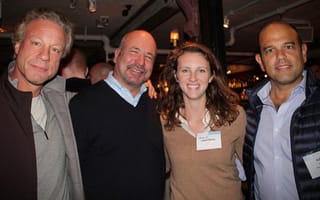
Larry Bohn has quite the resume.
Today, he’s a celebrated member of Boston’s VC circuit who’s made investments in tech companies like Drift, Kensho and Black Duck Software.
But prior to becoming managing director of Boston venture capital firm General Catalyst, Bohn (pictured second from the left) delivered groceries, drove a taxi, worked on a farm, was a short-order cook, managed a pool hall and taught literature and composition at a junior college.
Armed with the computer programming fundamentals and some serious writing chops, Bohn eventually landed a job at Data General where he wrote manuals on operating and programming 8- and 16-bit computers. From there, he rode the software wave through to the tech boom of today. Over the years, he’s gone on to build three major software companies — two of which he saw through IPOs as CEO.
We caught up with him to talk tech and learn more about the unusual path that led to becoming managing director of GC.
How did you get into venture capital?
As an entrepreneur going back many, many years, I’ve worked with many venture investors and a number of venture-backed startups. There have been a number of opportunities to join firms, which are always looking for entrepreneurs who might be good investors. You just have to have a creative mind and curiosity. When GC was just starting, I had the chance to get into the new firm and make an impact. It started with four guys; I was the fifth.
You’ve had an unusual career path. How has that shaped the way you work at GC?
I would say that I’ve had a lot of varied jobs before getting into the tech business. When I got into tech, I worked my way up from technical roles, which gave me a good grounding. A lot of people I have worked with are immigrants or the first member of their family to go to college. It gives you a good perspective of what it would be like to be a young entrepreneur starting out; I can relate to them on a personal basis. When it comes to early-stage ventures, I’m more interested in creativity and ambition and having a good sense of where the markets are going. I think my not having the traditional root for a VC in economics or tech works very well for early-stage investing.
Growing up in Boston, did you ever think the tech scene would become what it is today?
When computer tech was just taking off, I was very fortunate in that I took one college course in computer programming. Back then, that qualified me for a job at Data General. Today, you need a lot of training and a degree but I got into it because I knew just enough. It was clear at the beginning that this was a huge movement in the Boston area around the growth of technology, but it was fairly impossible to see how computer tech would change the world. I mean, who would have thought the President of the United States would be tweeting and we’d all be scared to death?
How do exits affect a tech community?
I would say most people building companies often look for companies that build at scale, so organizations like HubSpot are major companies to watch right now in Boston. Those types of companies signify the kind of size and ambition that’s a good model for the rest of the community. In order to have a vibrant tech community, companies like Wayfair, Demandware and HubSpot have to pave the way.
How do you handle failure?
You sort of never get used to it, but it sort of comes with the territory. Half of the companies we invest in fail on some level. You try and find decent outcomes for the companies even when they’re not succeeding.
What is your relationship like with your partners?
It’s pretty collaborative. There’s a lot of sharing of ideas and partnering on deals; we’re close without being suffocating.
What stands out to you about a founding team when they pitch you from a team dynamic level?
The founding team’s vision and ambition and their core DNA. Why does this team have the ability to build what they want to build?
What’s one thing people don’t know about you?
They don’t know that I am a terrific cook. I just built a fabulous outdoor pizza oven.
What’s your biggest “miss” and why did you opt not to invest?
Well you know Zendesk moved out to the West Coast but I missed that opportunity because I was working on something else and I didn’t think it was compelling enough. I also looked at Wayfair and didn’t invest in that because at the time, they didn’t have a brand. The question was whether they’d be able to build a brand themselves. We were skeptical and we were wrong.
Can you give a few examples of things that would scare you off from making an investment?
I would say if a founder doesn’t seem committed to the idea or if they’re not “all in” as they say. If you feel as though someone is only halfheartedly doing something, or if they’re too arrogant. That means they could be blind to the realities. Or, if I feel like they’re trying to do something outside their core DNA.
Photo via social media



